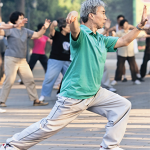NEW YORK (Reuters Health)—Tai chi improves fibromyalgia symptoms at least as effectively as aerobic exercise, according to a new trial.
Aerobic exercise is the most commonly recommended non-drug treatment for fibromyalgia, Dr. Chenchen Wang of Tufts University School of Medicine in Boston and her colleagues note in The BMJ, online March 12.1
However, Dr. Wang tells Reuters Health, people with chronic pain can find it daunting to undertake gym-based workouts. Tai chi, a traditional Chinese practice, has been shown to help people with fibromyalgia, osteoarthritis and rheumatoid arthritis, she adds, and could offer a gentler alternative. “Patients really enjoy this type of exercise,” she says.
Dr. Wang and her team randomly assigned 226 patients to one of four tai chi groups or an aerobic exercise group. Tai chi consisted of 60-minute sessions, once or twice a week, for 12 or 24 weeks. The aerobic intervention included an hour long, moderate intensity cardiovascular exercise offered in group format twice a week for 24 weeks. Both groups were also instructed to incorporate a half-hour of exercise into their daily routine.
At 24 weeks, the tai chi group showed a 5.5-point greater improvement in fibromyalgia impact questionnaire (FIQR; range, 0–100) score compared with the aerobic exercise group (P=0.03).
Secondary outcomes such as patients’ global assessment, anxiety, self efficacy and coping strategies also improved significantly in the tai chi group versus the exercise group.
Among patients who performed tai chi or aerobic exercise with the same intensity and duration (twice a week for 24 weeks), FIQR improvement was 16.2 points better with tai chi (P<0.001).
There was a 9.6 point higher improvement in FIQR for the groups that received 24 weeks of tai chi vs. the 12-week groups (P=0.007). The 24-week groups also had greater improvements in measurements of depression and mental health.
All five groups also showed similar reductions in analgesic, antidepressant, muscle-relaxant and anti-epileptic drug use.
At 52 weeks, the differences between mean FIQR score between the tai chi groups and the aerobic exercise group persisted, but were no longer significant.
The training program completed by tai chi instructors in the study is available online for free, Dr. Wang notes, and people who are interested in starting the practice can find a class or teach themselves. Study participants continue to call her office to find other opportunities for tai chi training, she added.
“What we found suggests that patients may be more likely to enjoy, manage and continue to practice tai chi, perhaps because it is a gentler, low-impact movement with minimal side effects,” she writes in an essay accompanying the study. Physicians should “rethink” what type of exercise they recommend for fibromyalgia patients, Dr. Wang urges, with the goal of finding approaches that patients will “embrace in the long term.”2
Amy Price, a patient editor at The BMJ who has chronic pain due to past trauma, wrote a commentary accompanying the study. When she first started tai chi, Price writes, “I could only do ten minutes, three times a week, with constant supervision, because of memory and balance problems. Gradually, over about six weeks, my balance improved and this reduced anxiety and increased strength in my broken body. The ingrained philosophy of tai chi is to leverage force rather than resist it, and I still use this strategy regularly to manage pain.”3
In a telephone interview, Price tells Reuters Health that tai chi does not help everyone, but that she has seen it help people with neurodegenerative diseases including Parkinson’s, multiple sclerosis and early-stage dementia.
“It helps your system learn to work together naturally again,” she adds. “For me it was really helpful, and it has a kind of grace to it. You don’t have to be coordinated like you would to do dancing or something like that.”
References
- Wang C, Schmid CH, Fielding RA, et al. Effect of tai chi versus aerobic exercise for fibromyalgia: comparative effectiveness randomized controlled trial. BMJ. 2018 Mar 21;360:k851. doi: 10.1136/bmj.k851.
- Wang C. Time to rethink exercise for fibromyalgia care. BMJ. 2018 Mar 21.
- Price A. The unintended consequences of tai chi for fibromyalgia. 2018 Mar 21.


